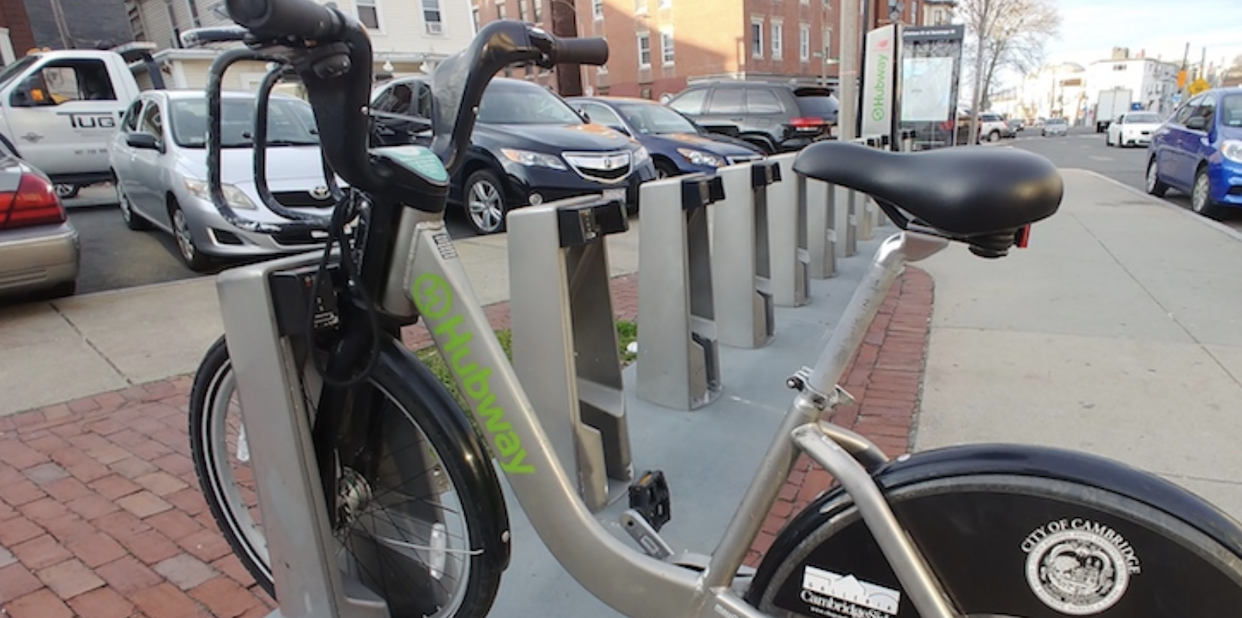Hubway’s low-income program goes regional, but infrastructure’s still inadequate
As the bike-sharing industry becomes a multibillion-dollar race across the country, cycling options for Bostonians are getting more affordable and more competitive.
In Boston, Cambridge, Brookline, and Somerville, Hubway reigns due to exclusive contracts with those cities. The publicly owned and privately operated service, which was recently renamed Blue Bikes as part of a partnership with Blue Cross Blue Shield of Massachusetts, has attempted to increase accessibility with a series of equity opportunities. Among them is a new regional income-based eligibility program made available early February. It’s offered to individuals who own SNAP/EBT cards, or are enrolled in other assistance programs or otherwise meet income requirements.
While the service offers $8 24-hour passes and $15 three-day passes, its primary subscription is a $99 annual pass. The low-income program halves this cost with a $50 annual membership as well as $5 monthly memberships. While trips over 30 minutes are surcharged on the traditional plans, the new program also offers up to 60 minutes of travel before charges are accrued. EBT card holders may sign up online, while individuals who have documented income eligibility or are on assistance programs may enroll at one of several guided enrollment locations.
“We have been working with our partners in other municipalities to develop a seamless regional system for folks who have a lower income,” Stefanie Seskin, the active transportation director for the Boston Transportation Department, said.
Boston has offered a discounted membership for city residents since shortly after Hubway’s 2011 launch, with more than 800 income-eligible members from the city alone entering into the regional system, according to Seskin. “One of our goals with having a regional program was to really expand that number,” the director added. “We know that the folks who signed up through the income-eligible program are on the whole more diverse than the folks signing up for bike share in our regular program. More people of color, more women.”
Seskin also noted that the majority of these riders use the service at least once or twice a month, with some using it daily.
Becca Wolfson, executive director of Boston Cyclists Union, said the new program would also offer a way in for riders without bank cards.
“Back when [Hubway] started in 2011, there was a lot of concern about how it could also be a resource for the unbanked because you needed a credit card to sign up, and that’s a barrier to a lot of low-income folks,” Wolfson said. “The city of Boston has been working really hard to find a way to break down those barriers.”
Opening up bike sharing as a public transportation option for lower-income residents could lend a wide variety of residents a fast and efficient alternative. Steven Miller, a member of the LivableStreets Alliance board of directors, said it’s nothing new for bikes to serve as crucial transportation utilities in metro areas.
“We tend to underestimate the number of low-income people who are already riding bikes,” Miller said. “People from Latin America, people from Asia are both coming from places where bike riding is a social norm not confined to children. There are a lot of people going to and from third-shift jobs when the MBTA doesn’t run, [such as] people in the hotel and restaurant business who are low-wage. All these people have a much higher use of bicycles for transportation than the public perception usually notices.”
Wolfson also said that readily accessible bikes would particularly benefit late-night employees, such as those working for restaurants and health providers, who may not have access to a car or are constrained by evening bus schedules. She pointed to studies showing that people in lower-income neighborhoods travel 20 to 40 minutes longer to work on average than people in more affluent places.
“If you have access to a bike, you can shave 20 to 40 minutes off of a trip easily rather than take a bus to a bus and wait,” Wolfson said. She stressed the versatility of bike sharing in multimodal transportation, as riders could take their bus or commuter rail to a bike hub and vice versa.
“You can easily ride a bike and get pretty much anywhere faster.”

For public bike sharing to become a truly dependable transportation solution for regular commuters, Motivate, the firm that manages Hubway’s implementation, will have to continue addressing issues of bicycle and dock availability that plagued Hubway’s rollout. In a 2016 Dig article on the matter, outages at that time had particularly impacted stations outside of downtown, like in Jamaica Plain, Roxbury, Charlestown, and Somerville. In October of that year alone, there were 14,887 instances of full or empty stations across Hubway’s 185 docks.
“When you have a transportation that works, you need it to be reliable,” Wolfson said. The cyclists union director said that bike sharing needs to be an integral part of state and city plans to cut down transportation emissions. “Just as the Red Line is in the paper every day for having trains that are overfull and trains that are breaking down and people don’t have a reliable commute time, [full or empty Hubway stations are] absolutely a problem.
“It’s a stated goal of the city of Boston,” she said. “They want to reach 10 to 20 percent modeshare by 2030, and we’re at about 2.5 percent now. If reliability isn’t there, people won’t choose it.”
“I know in the past there was some difficulty always making sure there were enough bikes in all the places people wanted to use them,” Miller of LivableStreets Alliance said. “But I know that Hubway has recently renegotiated its contract with Motivate so that Motivate has much better alignment of their financial incentives with making sure that everybody has access to bikes where and when they need it. And I think that will help improve if not eliminate some of those past problems.”
As a result of the new long-term contract between the multiple participating cities, Motivate, and Blue Cross Blue Shield, more than 100 new stations will be added to the 180-station and 1,600-bike system by the end of 2019, bringing the network to 3,000 bikes. Additionally, while Cambridge had been the only municipality that kept the majority of stations open through the cold months, this past winter saw “almost all” stations open and operational in Boston, Brookline, and Somerville along with Cambridge.
Seskin, the acting transit director in Boston, said the city’s undergoing “the biggest investment in bike share” in history, including during Hubway’s launch. She also said an upcoming expansion of service into Dorchester, Mattapan, and Roslindale will significantly help lower-income residents. As for the roads between the bike docks…
Wolfson expressed disappointment that Hubway’s increasing reach is not accompanied with an expansion of facilities for bikes and other related improvement needs.
“Dorchester, Roxbury, and Mattapan have the worst infrastructure and the most speeding and lack of bike lanes, let alone protected bike lanes, but unfortunately we feel that the city is lagging behind, period,” Wolfson said. “The entire city needs much more of an investment in bike infrastructure and a much more rapid implementation.”
“They’re not funding it at the rate they should be, and it’s not going to be implemented at the rate that it should be,” Wolfson continued. “There’s a disconnect in the mayor saying, ‘I want Boston to be the best place for biking in the country’—and that’s really paying lip service—and not showing us through his actions and through rapidly implementing projects that we believe should be much easier than they’re proving to be if there was political will and a desire to actually get things done.”

Boston’s suburbs, meanwhile, will soon be host to thousands of new dockless bikes. As private bike-sharing companies have proliferated, riding a multibillion dollar wave of venture capital, vendors LimeBike and Spin have been selected by the Metropolitan Area Planning Council to operate in 15 municipalities including Arlington, Chelsea, and Waltham, according to the Boston Globe. As well, Beijing-based bicycle giant ofo has launched services in Worcester, Chelsea, and Malden.
Hubway will continue to hold the exclusive rights to bike sharing in Boston, Brookline, Cambridge, and Somerville until at least 2022. A stark difference in focus has already become apparent between Hubway and its private competition, similar to that between public transportation and Uber.
“There is a huge benefit from having something as a public program because that means it’s going to be shaped by the full equity agenda of the public sector,” Miller said. “On the other hand, it has to move slower and satisfy a broad range of interests. The private companies are more nimble, but they ultimately don’t serve anything except the profit motive of their owners.”
For now, these firms will be able to leverage a large degree of capital as they test the potential of bike sharing across the Commonwealth. According to startup database Crunchbase, ofo has raised $2.2 billion in funding since its founding in April 2014, while LimeBike has raised $132 million since January 2017 and Spin has raised $8 million since November 2016.
Despite their sudden wealth, Miller expects private firms to offer little in the way of the accessibility and equity opportunities that Boston has introduced through Hubway.
“The dockless [privately run] programs are not going to put money or energy or staff into training low-income people, reaching out to low-income people, or helping work with kids, much less giving people ownership of their bikes,” Miller said. “In the beginning, this is not going to be noticeable because they’re going to start by being really cheap as they fight for market share.
“In the long run, however, their profit-seeking requirements are going to force them to pull back from any population from whom they cannot secure sufficient profit—and we all know who that’s going to be.”










